Tagging Programs
The Rhode Island Division of Marine Fisheries is actively conducting several fish and crustacean tagging studies. These programs are critical for fishery managers to successfully assess fish populations. Tagging studies contribute critical data on migration and movement patterns, habitat utilization, population structure, and even the mortality rates of fish.
I Caught a Tagged Fish! Now What?...
Tagged fish and crustaceans are still subject to local regulations and must be released if outside legal size and/or bag limits. Legal size tagged fish may be kept by anglers. Anglers planning on releasing a tagged fish should record the tag’s information and leave the tag in the fish to potentially be caught again and provide even more information. Before releasing the fish, record its length, if possible, the location, and set it free.
If the fish is of legal size, and you intend to keep it to eat, then leave the tag in the fish until you get home. The tag will have the necessary information for contacting whichever organization tagged it. (Call the organization and provide the details of the catch. They will ask for the size, the date, and the location.) Don’t worry about revealing your secret fishing spot – a general area will suffice. Scientists will use that information to determine how much the fish grew, where it had migrated and how long it was at large.
Find out more about each species specific study conducted by RI DMF below.
Current Tagging Programs
Information For Taggers
Upload Tagging Data Sheet Here [https://docs.google.com/forms/d/1YyZltLrME_SDuhYfowKhu47ukQcOP0zFBhKwRTLazBM/edit]
Did You Catch A Tagged Summer Flounder?
Please fill out this form [https://docs.google.com/forms/d/1YyZltLrME_SDuhYfowKhu47ukQcOP0zFBhKwRTLazBM/edit]. If you would like, please fill out your contact information in the recapture form and RI DMF will send you a reward hat.
Tag being placed
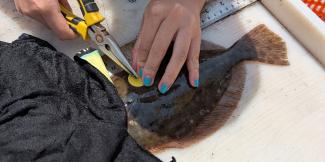
Tagged Summer Flounder
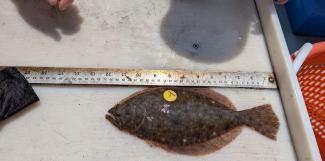
Background Information
The Rhode Island Division of Marine Fisheries is conducting a project that seeks to describe summer flounder stock dynamics in Rhode Island state waters with the objective of supporting science-based management of the resource, particularly in relation to recent declines in the availability of summer flounder to nearshore recreational anglers. A major component of this project consists of a mark-recapture study using conventional disc tags. The low cost and relative ease in applying these tags to marine species makes them a desirable tool when looking to achieve a high sample size with a large team of scientists. Peterson disc tags, each with their own serial number and the phone number of the project team, will be deployed on sub-adult and adult summer flounder, with a goal of tagging up to 1000 flounder over the course of the study. Tags will be deployed by recreational anglers within the private and for-hire sectors by working with the Rhode Island Saltwater Anglers Association (RISAA) [https://risaa.org/] and the Rhode Island Party and Charter Boat Association (RIPCBA) [https://rifishing.com/].
Participating anglers are asked to tag fish caught below minimum legal size, and any legal sized fish they release. Information requested from anglers when tagging fish includes: serial tag number, date, location (latitude and longitude), size (length, and weight when possible) of the fish, and the depth the fish was obtained from. Disc tags will contain the phone number of RI Division of Marine Fisheries, where harvesters can call in to report information on recaptured fish.
The ultimate success of this project is reliant on people/the public recapturing the tagged fish and reporting the recaptured fish to scientists. As an extra incentive, anglers who catch and report a tagged fish will be rewarded with an RI DMF summer flounder hat! So, if you catch a tagged fluke this summer, be sure to let us know so you can show off your support of science-based management and keeping RI fisheries sustainable.
If you encounter a tagged lobster or Jonah crab, please report the following information to the phone number on the tag (by voicemail or text): Date, location, tag #, and whether you kept or released the animal. If easier, you may text a photograph of the tag and another photo of the plotter’s coordinates.
If you can, please also report carapace length in millimeters, and report whether females are carrying eggs.
Please reach out to Corinne Truesdale at corinne.truesdale@dem.ri.gov with any questions.
Lobster with tag
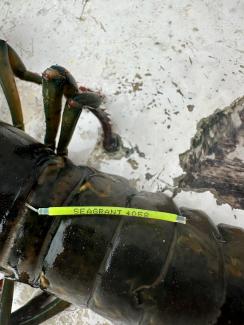
Jonah crab with tag
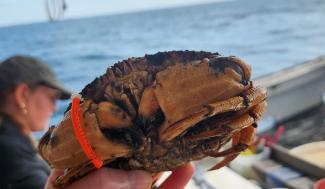
Background Information
The RIDEM Division of Marine Fisheries has been tagging lobsters and Jonah crabs as part of two separate projects. Both projects use similar tagging methods and rely on local harvesters to report recaptures of tagged lobsters and crabs.
The first project is a ventless lobster trap survey, which is being conducted in the West Passage of Narragansett Bay and Rhode Island Sound, to examine the effects of an offshore wind electromagnetic frequency (EMF) cable on lobster and crab movements. Specifically, we are interested in how lobster and Jonah crab movements may change near the cable route once it begins transporting electricity from offshore wind turbines.
Another project, funded by the Sea Grant American Lobster Initiative, is examining the movements of lobsters tagged in inshore and nearshore Rhode Island Sound. This project was developed in collaboration with local lobster harvesters, who are interested in seasonal inshore-offshore movements of lobsters. Our goal is to tag more than 7,000 lobsters for this project, to get as detailed an understanding of movements by size/sex/season as possible.
If you find a tagged horseshoe crab, visit fws.gov/crabtag to report the tag number, location, and date of find. Not only will you be contributing to answering important questions about the horseshoe crab population in Rhode Island, but you will also receive a certificate of participation and a pewter horseshoe crab pin from the USFWS!
Tagged horseshoe crab
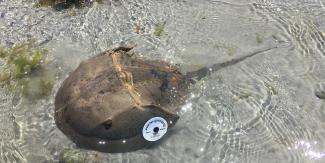
Tagged pair of horseshoe crabs
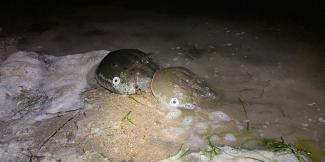
Background Information
In addition to conducting spawning surveys, the RI DEM Division of Marine Fisheries also tags horseshoe crabs as part of the US Fish and Wildlife Service Horseshoe Crab Cooperative Tagging Program. Many states, universities, and non-governmental organizations along the Atlantic coast participate in the program which provides important information on horseshoe crab population dynamics. The data is used by the Atlantic States Marine Fisheries Commission to help assess horseshoe crab population status and inform management decisions in support of sustainable fisheries. This data also supports important research on their distribution, movement, longevity, and mortality.
Did You Catch A RI DMF Tagged Striped Bass?
Please call RI DMF Tagging at 401-423-1924
Striped Bass being tagged
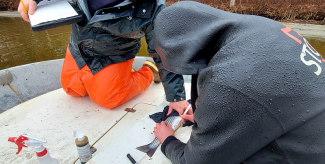
Fyke net used to catch striped bass
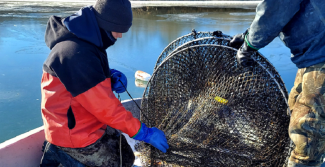
Background Information
Striped bass is by many metrics the most popular sportfish in Rhode Island and contributes substantially to the local economy through both recreational and commercial fishing. In recent years there has been increased interest, primarily from recreational anglers and charter fishing enterprises, in resident and holdover striped bass in state waters. Resident fish are those that remain in local Rhode Island waters year-round and potentially use Narragansett Bay or Rhode Island coastal ponds as spawning and nursery grounds. Holdover striped bass are individuals that were hatched in another estuary (e.g., Chesapeake Bay, Delaware Bay, Hudson River), migrated north, and have remained in Rhode Island waters during the colder winter months as opposed to migrating back to their natal estuary for the winter. With growing interest in these winter populations of striped bass has come increased fishing pressure. And because it is likely that resident and holdover striped bass in Rhode Island during winter months have both relatively small population sizes and limited winter habitat ranges, fishing pressure may be significantly magnified during winter months. To properly manage resident and holdover populations of striped bass in Rhode Island, the Division of Marine Fisheries must first understand where the fish are distributed annually and what their activity patterns look like in the colder winter season.
To this end the Division initiated a striped bass tagging project in several coastal pond systems in the winter of 2023/2024. Striped bass are tagged with acoustic telemetry tags and external spaghetti tags. If you catch a tagged striped bass this year be sure to let us know so you can show off your support of science-based management and keeping RI fisheries sustainable.
Did You Catch A Tagged Winter Flounder?
Please call RI DMF Tagging at 401-423-1924
Winter Flounder with acoustic tag
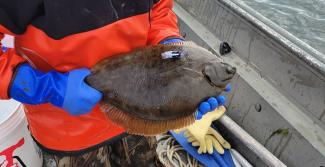
Winter Flounder with disc tag
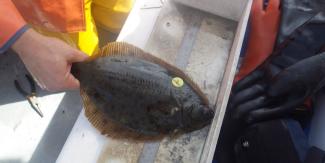
Setting the fyke net
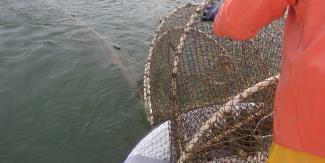
Measuring
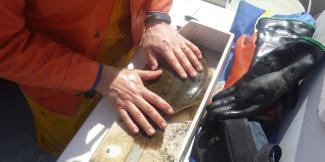
Background Information
The Rhode Island Division of Marine Fisheries has been conducting a winter flounder tagging project annually since 1999. This work seeks to describe winter flounder stock dynamics in Rhode Island state waters with the objective of supporting science-based management of the resource.This mark-recapture study uses conventional disc tags and is conducted during the winter fyke net survey that occurs annually in Ninigret Pond and Potter Pond. A commercial fisherman who had historically fished for winter flounder in the coastal ponds agreed to assist the Rhode Island Marine Fisheries staff to operationalize the survey at its inception. The low cost and relative ease in applying these tags to marine species makes them a desirable tool when looking to achieve a high sample size with a large team of scientists. Peterson disc tags, each with their own serial number and the phone number of the project team, are deployed on sub-adult and adult summer flounder, with a goal of tagging up to 100 flounder per year.
The ultimate success of this project is reliant on people/the public recapturing the tagged fish and reporting the recaptured fish to scientists. As an extra incentive, anglers who catch and report a tagged fish will be rewarded with an RI DMF winter flounder hat! So, if you catch a tagged winter flounder this year be sure to let us know so you can show off your support of science-based management and keeping RI fisheries sustainable.
Information For Taggers
Upload Tagging Data Sheet Here: https://forms.gle/i9qmQe4pbWgPywVB8
Did You Catch a Tagged Little Tunny or Atlantic Bonito?
Please give us a call at 401-423-1932

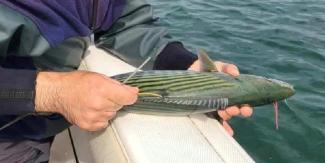
Background Information
The Rhode Island Division of Marine Fisheries is working with a collaboration of angling groups, regional partners, and commercial harvesters to conduct a project that seeks to collect data on Atlantic bonito and little tunny (also called Albies or false albacore). A major component of this project consists of a multi-year mark-recapture study using dart tags. This component was made possible by our project partner the Rhode Island Saltwater Anglers Association (RISAA) [https://risaa.org/].
The low cost and relative ease in applying these tags to marine species makes them a desirable tool when looking to achieve a high sample size with a large team of volunteers. Dart tags, each with their own serial number and the phone number of the project team, will be deployed on Atlantic bonito and little tunny with a goal of tagging up to 1000 individuals over the course of this study. Tags will be deployed by recreational anglers within the private and for-hire sectors. Information requested from anglers when tagging fish includes tag number, date, location, and size (length and weight when possible) of the fish. Dart tags will contain the phone number of RI Division of Marine Fisheries, where harvesters can call in to report information on recaptured fish. The ultimate success of this project is reliant on people/the public recapturing the tagged fish and reporting the recaptured fish to scientists.
